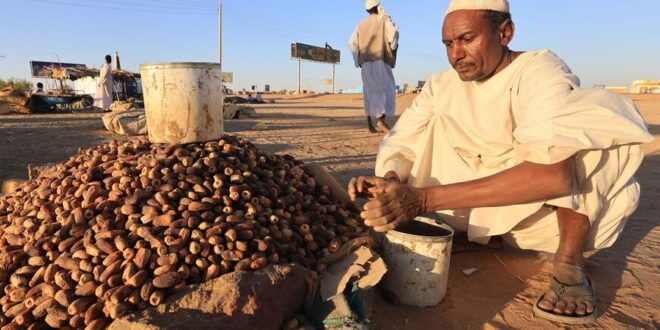In addition to its natural resources and agricultural output, Sudan’s geographic location also makes it critical to Gulf security.
Since the 1970s, Arab Gulf countries have pledged billions of dollars in aid and investment to Sudan in sectors including agriculture, energy and infrastructure, yet many of these projects fail due to the country’s political uprisings and warring factions.
This time is no different as Khartoum descends into a conflict between head of the Sudanese military Gen. Abdel Fattah al-Burhan and Rapid Security Forces commander Gen. Mohamed Hamdan “Hemedti” Dagalo that has killed over 400 people in less than two weeks.
Sudan is fertile in ways that its Gulf neighbors are not, with more substantial water resources, minerals and agriculture.
Despite the country’s ongoing instability, Sudan’s strategic location is a source of natural wealth providing petroleum and natural gas reserves and mineral deposits such as gold and manganese, according to the United Nations Conference on Trade and Development. Sudan exported 16.7 tons of gold worth about $1 billion in the first half of 2021, according to central bank data, with almost all of it going to the United Arab Emirates.
Sudan’s geographic location also makes it a factor in the regional security interests of Gulf countries, so it will likely continue to see pledges of aid and investment amid its ongoing uncertainty.
Why it matters: For many years, Sudan has been considered a potential food basket for countries of the Gulf Cooperation Council (GCC), which import about 85% of their food. The country’s agricultural products include sugar, wheat and sorghum.
In June, Sudan’s Minister of Trade and Supply Amal Saleh Saad announced that with funding from Arab countries, her country could secure food for the Arab world and compensate for shortages of Ukrainian and Russian wheat.
Eckart Woertz, director of the GIGA Institute for Middle East Studies, said Sudan’s is an old story that has been told for decades.
“GCC countries talked about developing Sudan as a bread basket for Arab countries since the 1970s, also in 2008 and onwards,” he said. But it’s not happening due to political risk, lack of infrastructure and corruption.
He added that the Gulf countries are losing interest as a result and predominantly rely on food imports from other more reliable countries such as Brazil and even Russia and Ukraine despite the ongoing fighting between them.
“Agriculture investments have been announced repeatedly and written about regularly in the media, but not many have actually been implemented or have a major impact on the region’s food security,” Woertz told Al-Monitor, explaining that regional sovereign wealth funds could easily afford to fulfill their pledges of critically needed aid and investment but seem not to find it beneficial to do so.
“These investments are not even worth 1% of their portfolio, maybe not even 0.1%,” Woertz added. The current conflict might pause short-term projects, he said, but is unlikely to change the economic approach of Gulf countries toward their investments in Sudan.
Najah Al Otaibi, a Middle East analyst based in London, said that despite Sudan’s unfulfilled economic potential, GCC investment in Sudan still serves a major purpose.
“It can be a source of security for Abu Dhabi and Riyadh, where there is political competition between them, and rival countries such as Turkey and Qatar that try to have a greater presence in the Horn of Africa,” she told Al-Monitor.
It’s strategically located in the heart of the Nile Valley, on the Horn of Africa and connected to the Red Sea, she added.
Sudan and South Sudan export their crude through a pipeline to the Red Sea, according to S&P Global, which reported last week that the instability in Sudan has raised concerns about Saudi-led OPEC’s oil production levels.
Sudan produces about 60,000 barrels per day, according to S&P, about 100,000 less than neighboring South Sudan, sub-Saharan Africa’s third-largest producer.
Background: Saudi Arabia and the UAE became major aid donors to Sudan as of 2015, according to the Arab Gulf States Institute in Washington. Along with other Arab countries, they contributed about 2.3% of total aid to Sudan between 2000 and 2009.
The UAE has a long history of providing aid and loans to the war-stricken country since 1976, according to the Abu Dhabi Fund for Development. As of 2012, the foreign aid agency was managing about $470 million in loans and grants that were divided among 13 projects in sectors including transportation, energy and agriculture.
More recently in June 2022, the UAE said it would build a new Red Sea port in Sudan as part of a $6 billion investment package, according to Reuters. This aid package involved measures to enhance trade, fund a large agricultural project and deposit $300 million into Sudan’s central bank.
Saudi Arabia’s Public Investment Fund pledged $24 billion in Sudan in October of last year, seeking investment opportunities along with Egypt, Jordan, Iraq, Bahrain and Oman.
It created six companies to implement these investments in sectors including infrastructure, real estate, mining, agriculture and manufacturing.
 Eurasia Press & News
Eurasia Press & News




